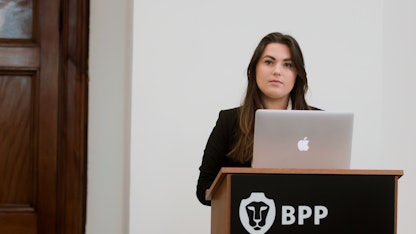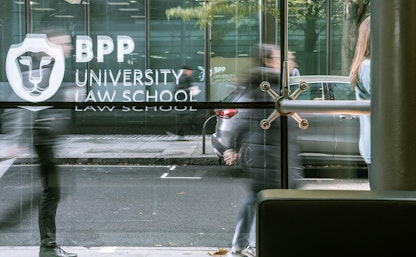Top tips before starting law school

Our students share what they'd wish they'd known before starting law school.
The journey towards a career in law is incredibly rewarding but can be intense at times. To make life easier, we've asked our students for their top tips on starting law school.
These tips will help you prepare to succeed at BPP University, so you can get off to a great start from day one. Our students have shared insights on the course experience, important guidance they received, and their advice for how to tackle studying postgraduate law.
A step up from undergraduate law
Andrea Hounto, BTC (Master's)
I remember bursting into tears during one of my advocacy mocks because I felt out of my depth. My tutors at me down and gave me some of the best advice to overcome imposter syndrome, which I carry with me to this day. He explained to me that a large part of being a barrister is about confidence, and that if I don't believe in myself and my abilities, it's unlikely anyone else will.
Lorena Turbatu, LPC
The level of work and manner of teaching is completely different from your usual undergraduate degree or taught master's. You are no longer writing academia and analysing the opinions of a particular judge, instead you are taking the actual law, applying it to client scenarios, and providing the appropriate advice. Problem question techniques learned from your undergraduate degree are your best friend - the earlier you grasp them, the better!
Tom Fennelly, Law Conversion Course (PGDL) and LPC
As the LPC is a postgraduate course, there is a clear understanding that the work needs to be done efficiently and to a high standard. It may seem daunting, and there may be times you feel as though there are students who can understand concepts easier than you, but if you apply yourself the course is very manageable.
Managing your time
Carla Fischer, Law Conversion Course (PGDL)
I think time management is key. I like doing a lot of different things and just scheduling them in. Having a few hours of learning and then breaking that up with pro bono work, and even speaking to a student adviser about what we're looking to do. It's more of a variety, so I never get bored of one thing.
Jennifer Chandler, LLM Law Conversion with SQE1
Try and keep on top of your work as much as possible, but also make sure to take time for yourself. I find working in the centre helpful so I can associate home with more relaxing activities, and because there are tutors on hand to help and books to help you. Most evenings after finishing I'll just relax, but this can also be a time to work on some of the pro bono opportunities BPP offers.
Tom Fennelly, Law Conversion Course (PGDL) and LPC
A good section of the PGDL and LPC is 'self-taught', and this may be challenging at first. However, it all makes sense when it comes to undertaking your exams - as your ability to condense and understand key concepts through your own research, which is further compounded through group discussion led by tutors, is invaluable.
Stay organised
Callum Martin, LLM SQE1&2
The best piece of advice is to stay organised. It sounds simple, but it's really not. There are so many different modules that you need to revise. If you stay organised throughout your entire course, you will have access to all your notes, you'll know exactly where to look for things, and revision will be so much easier.
Tom Fennelly, Law Conversion Course (PGDL) and LPC
Time management, punctuality, organisation, and responsibility are all paramount to succeed on a law course. There is simply no way around this. It's a good idea to begin work on these practices before starting law school so that you've developed the habits and are in the best possible position when you begin your course.
Lorena Turbatu, LPC
The LPC is very fast-paced, and the need to consolidate 1-2 days after your seminar is paramount to ensure you have grasped the key points while they're still fresh in your mind. This equally saves a lot of time when it comes to revision.
Make the most of online resources
Simran Kaur, LLM SQE1&2 (part-time)
The BPP Hub helpfully lists out all of the prep that you need to do for each workshop, and all of the slides for that prep are found on BPP Adapt. On Adapt you have different elements which essentially contain the slides for each bit of reading that you need to do.
Taking advantage of pro bono opportunities
Carla Fischer, Law Conversion Course (PGDL)
Pro bono completed the course. Learning the theory of law, but then also having an opportunity to apply that right away and get that client-facing experience. A lot of the law isn't thinking about it, it's applying it. There's also a lot of recognition for your work. There are pro bono awards with different categories and it's not only an appreciation for the hard work that you've done, it's something you can put on an application.
Lorena Turbatu, LPC
Practice and academic law are entirely different. Life in practice is exactly what the LPC teaches, and the earlier you get work experience in practice, the better you will grasp and understand the necessary knowledge and skills to succeed as a great legal professional.
Planning for life after law school
Lorena Turbatu, LPC
The earlier you start to research and apply for open days, vacation schemes, training contracts, and qualifying work experience, the better. Open days and vacation schemes will give you first-hand insight into a career in law, along with the opportunity to network with individuals in the profession who may be able to provide valuable insight into pursuing a law career.
Alexia Radu, Law Conversion Course (PGDL)
The careers service was really helpful. They reviewed my application, gave me extra pointers, and told me what I can improve. It was great using their feedback because applying for these vacation schemes is a tiring process, but I feel like they do make it better.
Andrea Hounto, BTC (Master's)
Pick yourself back up after each rejection and remind yourself why you decided to pursue this path in the first place. Get feedback, find opportunities for growth and development, you can even take a break to recoup if you need to, and then try again.
Alexia Radu, Law Conversion Course (PGDL)
I'm not sure whether I want to be a barrister of a solicitor at the moment, but BPP gives me the opportunity to pursue either route, so I'm going to decide what I want to do next and then continue studying at BPP and then qualify. But the University has supported me in exploring both options so I feel quite positive about that.
Some quotes have been edited for length/clarity.
Don't miss out, there's still time to apply for our postgraduate law programmes this September.

